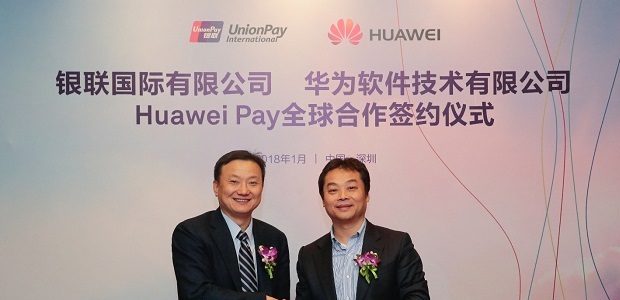
Huawei has signed a cooperation agreement with UnionPay International with the aim of working together to promote the globalization of Huawei Pay and accelerate its roll-out worldwide to provide a better mobile payment experience for Huawei mobile device users. The agreement marks the first joint effort between Huawei and Union Pay to bring Huawei Pay to the global market since the two companies worked together to create Huawei Pay in 2016.
In future, Huawei and Honor mobile phone users outside of China can make quick and easy mobile payments by adding their UnionPay bank cards to a phone that has enabled Huawei Pay and then placing their phone next to a POS machine that supports UnionPay mobile QuickPass. For security, Huawei Pay uses the all-device solution, as well as payment token technology to effectively protect cardholders’ privacy and data security.
„As China’s first security chip-based mobile payment service, Huawei Pay is already supported by 66 banks and is compatible with 20 mobile devices, including various mobile phones and smart watches. In 2017, 4 billion RMB worth of payments were made using Huawei Pay.”, according to the press release.
At the signing ceremony, Alex Zhang, President of Huawei Consumer Cloud Service, stated, “Open sharing is an important direction for the future of the digital economy and intellectual interconnection, which is why Huawei’s end-user cloud services built an open and globalized smart mobile ecosystem for the end-user experience. Huawei hopes to work with partners such as UnionPay International to provide more secure and convenient mobile payment services for every user of Huawei smart devices around the world.”
Larry Wang, Vice President of UnionPay International said, “UnionPay International carries out extensive cooperation with various players in the payment industry to integrate the advantages of each party. This cooperation with Huawei is of great significance. Firstly, with this agreement, the two sides realize cooperation on a global scale, and issuers outside mainland China can now launch Huawei Pay Pay-as-you-go once connected to the UnionPay Mobile Service Platform, which greatly saves time and costs. Secondly, UnionPay’s innovative products are an important propeller for the business localization of the two parties, and it supports payment upgrades in more countries and regions. Thirdly, cooperation between the two giants will jointly enhance the global influence of China’s independent mobile payment apps.”
Russia will be the first overseas market to implement the service. Currently, UnionPay bank cards are accepted at 85% of POS terminals and ATMs in Russia, with over 400,000 POS terminals accepting UnionPay mobile contactless payment. More than 10 Russian banks have issued about 1.3 million UnionPay bank cards. In addition to Russia, Huawei and UnionPay plan to offer Huawei Pay services to markets in Eastern Europe.
Relying on its „chip-device-cloud” synergies, Huawei actively distributes future smart products and creates the perfect full-scene smart-life experience for consumers. Huawei’s consumer services have won the favor of users worldwide. As of 2017, the number of global registered accounts have exceeded 340 million.
Banking 4.0 – „how was the experience for you”
„So many people are coming here to Bucharest, people that I see and interact on linkedin and now I get the change to meet them in person. It was like being to the Football World Cup but this was the World Cup on linkedin in payments and open banking.”
Many more interesting quotes in the video below: